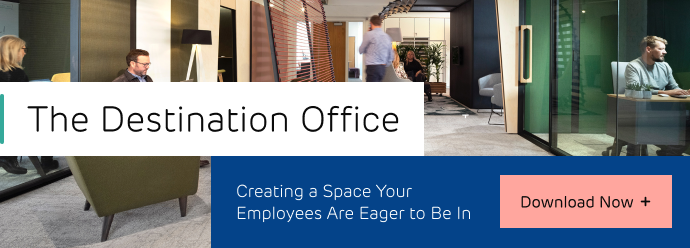A report by Deloitte claims that millennials will make up 70% of the global workforce by 2025. Others claim millennials and GenZers together will exceed 80% of the working population by 2030. The question for employers is what will they want from the workplace they are about to inherit.
But first, some revision:
Who are the millennials?
Millennials were born from 1981 to 1996, and research shows they are better educated and more tech savvy than previous generations. Although they came of age in a boom time for economies around the world, it’s important to note that on average, they earn 20% less than their parents did at the same stage of their careers.
Deprived of many things the preceding generations took for granted such as long-term job security and access to reasonably priced housing, millennials have famously looked to travel and other aspects of self-discovery to bring them personal fulfilment. Within the next 5 years, they will be moving into senior management roles and will be in charge of moulding the world of work for decades to come.
Who are Gen Z?
Gen Z are the ambitious, socially conscious, and hyper-connected young minds born between 1997 and 2012. For this cohort, the self-satisfaction of the Boomers, the settled status of Gen X and the entitlement of millennials seem a distant dream.
This generation have come of age in the era of pandemic and climate crisis. They are experiencing a world where social attitudes have become dramatically polarised; where ageing politicians push reactionary agendas. For many, the struggles of identity politics - and the urgency of issues like climate change are personally and deeply felt. This cohort are characterised as highly educated, sensible and sensitive. In some parts of the world, they are even known as the ‘educated pessimists’.
Why are they important?
Despite some big differences in their outlook, Millennials and Gen Zers share many of the same experiences, values and priorities.
And together they are about to become the defining power in the global workforce - outweighing the influence of Gen X and the tail end of the Boomers’ long-felt dominance.
What do they want from their world and their work?
If their parents and grandparents accepted lives of commuting drudgery in return for copper-bottomed pensions - these generations seem prepared to accept a more precarious job market in return for more:
- Portfolio careers
- Purpose led work
- Self care and self-improvement
- Social experimentation
- Digital liberation
Millennials and Gen Zers need you to listen
It’s not always about money for these guys.
Millennials and Gen Z are often looking for a special kind of flexibility and attention to their needs. But when they get it they will return the favour with hard work and loyalty:
Generation Z values salary less than every other generation: If given the choice of accepting a better-paying but boring job versus work that was more interesting but didn’t pay as well, Gen Z was fairly evenly split over the choice.
Deloitte
Flexibility over where and when they work
In Deloitte’s 2023 study of Millennials and Gen Zers the generations' desire for flexibility comes through loud and clear:
It is very important for me to work remotely and work flexible hours. It gives me more time to take care of my personal life, my mental health, my home life with my partner and for me to have better quality of life…Flexibility is very important, and I believe it is a trend without return, that all employers should adapt to.
Millennial, Female, Brazil
In fact, both generations have expectations around life/work balance that the Boomers can struggle to understand.
A new normal? WFH, digital nomadism and the 4 day week
As digital natives, Gen Z and the millennials often can’t see the rationale for much of the face-to-face interaction the preceding generations valued so highly. When virtual technology can get us all working together faster and more efficiently wherever we are, why must we all be in the office from 9 - 5? Why can’t we pick and choose where and when we work best?
And if the payoff for a more precarious career ladder is greater flexibility around lifestyle and working practices - then no wonder these generations are embracing radical ideas like digital nomadism and the 4 day week.
A fustian central government might be pushing back against the 4 day week - but as the Gen Z and Millennials take control it may not be a pressure they can resist for long.
How to make work more rewarding
Workplaces have to become more flexible and accommodating for a highly
mobile and digitally connected workforce.
Never mind wanting their cake - these generations can clearly see the cake and will vote for their feet if they are stopped from eating it.
Gen Z is a very practical generation… They know things are competitive. They’ve been told that for ages and I think they are willing to work hard. They just have to see that there’s a reward and not a reward two years from now.
And this reward doesn’t always have to be financial, it can be:
- The level of autonomy you give them
- The level of trust they are shown
- The learning and self-improvement opportunities on offer
- The quality of your company culture
What will Gen Z and Millennials want from their offices?
Does all this mean the office is obsolete? Far from it.
Steelcase research shows that these generations actually value the physical workplace more than other generations. But they value it in very specific ways - and they have demands:
1. More collaborative spaces
For these generations, the workplace is vital as a place for learning, collaboration and sharing creative excitement. When so much can be achieved at home, ‘coming into work’ needs to add a new dimension to our everyday experience.
Office experiences of collaboration and learning are more important to these generations than for the long-serving Gen Xers. Culture and connection give them a sense of belonging, which is why there is a new emphasis on building communities in the workplace:
A better vision for a workplace is a community — a place where people bond around shared values, feel valued as human beings, and have a voice in decisions that affect them.
Adam Grant, Organisational Psychologist
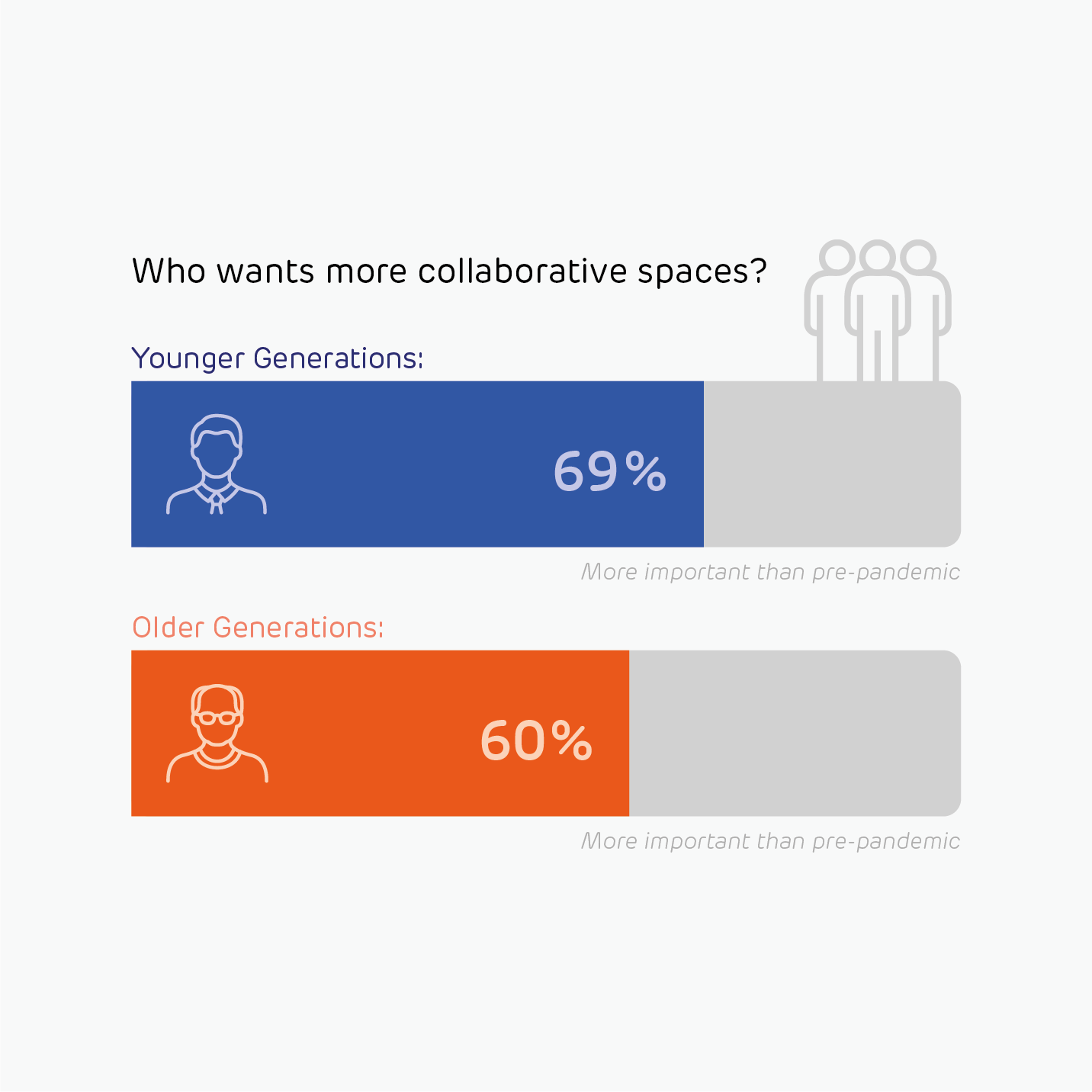 2. More privacy
2. More privacy
The younger generation don’t only want to come to the office to collaborate. They do want the choice to use the office for ‘heads down’ work, too. And they expect the experience to be significantly better than they can access in the busy, shared homes they live in.
Setting up flexible, connected workspaces with plenty of places for concentrated work (including booths and pods) will be a requirement for a thriving company in the future.
Open plan was the Gen X experience of the workplace, but the need for privacy is a must for the younger generations.
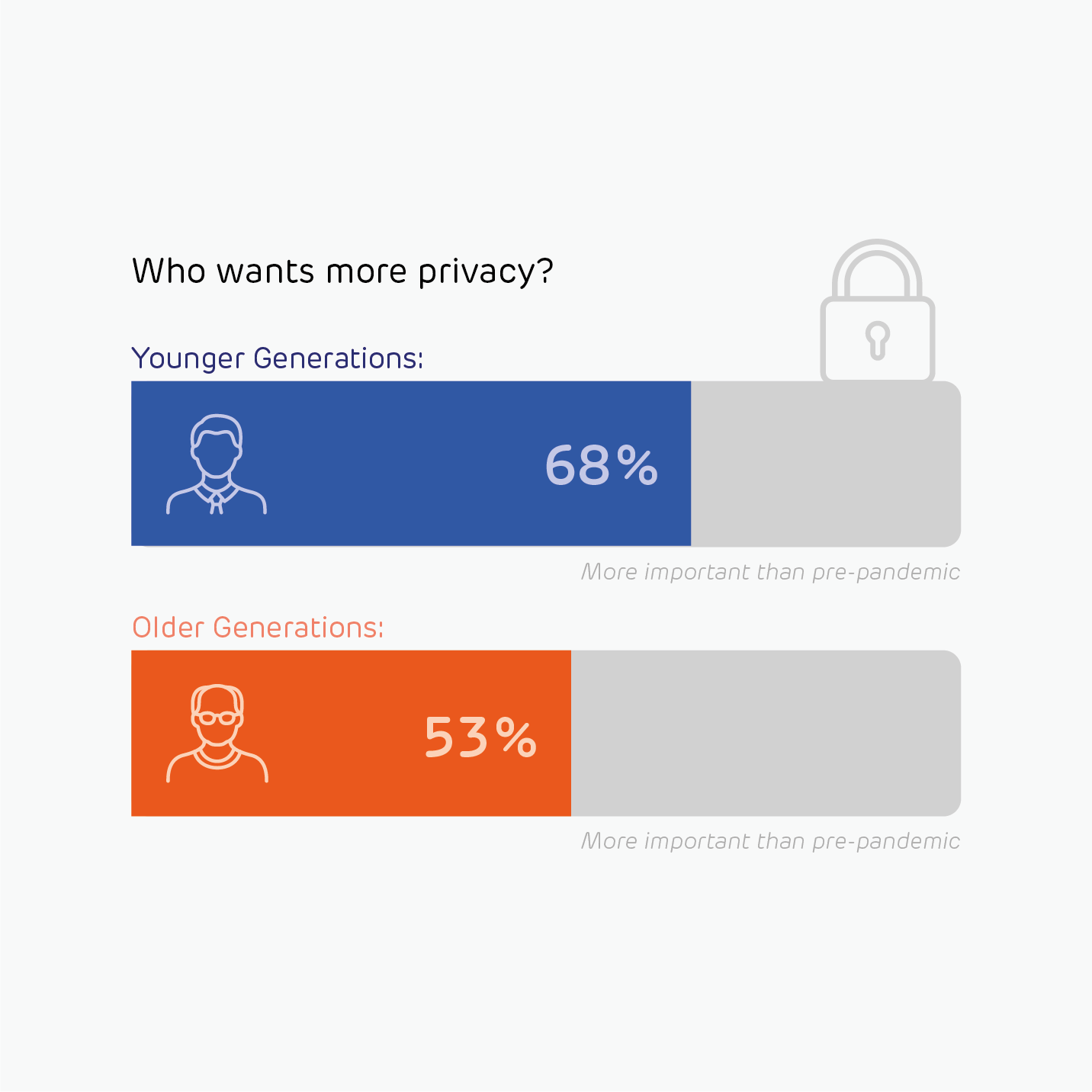
3. More comfortable, flexible furniture
These generations are unwilling to suffer in silence on uncomfortable and impractical furniture. The Steelcase research says younger people value design that enables their work. Think ergonomic, agile and adaptable furniture that can help them move between different work settings
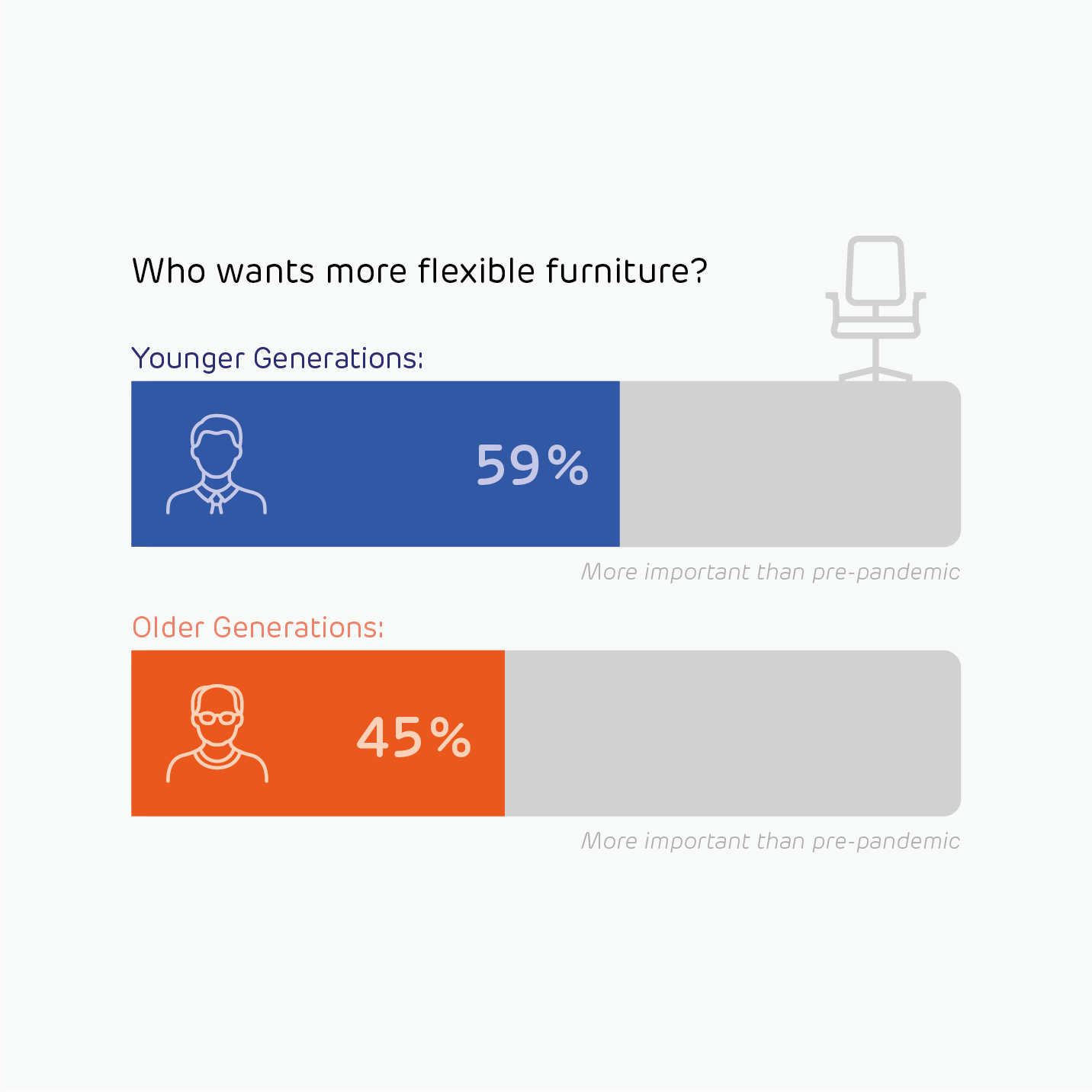
4. More sustainability
We know that Gen Z and Millennials are highly motivated by ESG issues. They are making connections between corporate actions and environmental they consequences on a micro and macro level. All the decisions you make around sustainability will be scrutinised more carefully by an engaged and thoughtful workforce.
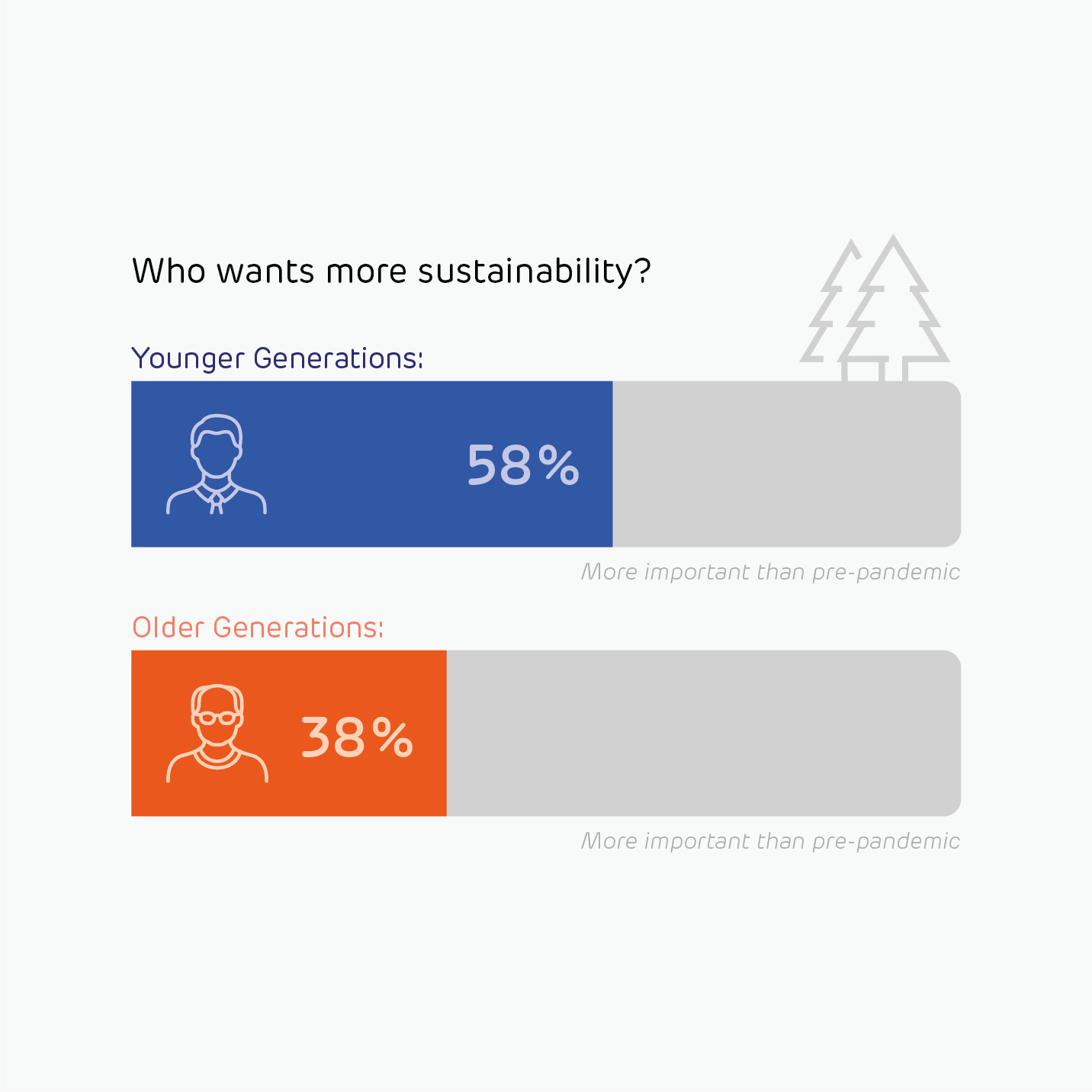
5. More storage lockers
Yes, you heard that right. If offices are to become more ‘destinations’ than everyday working locations without ownership of specific spaces, office designers will have to think practically about supporting this.
Lockers allow mobile workers to settle into spaces more quickly, giving them a place where they can safely stow away their bags, coats and lunch. They can help workers feel like they have a physical stake in the office and a place where they can store gym kits, extra clothes, shoes and stuff we don’t want to lug around. Combined with charging facilities they can help teams top up batteries whilst keeping valuables safe.
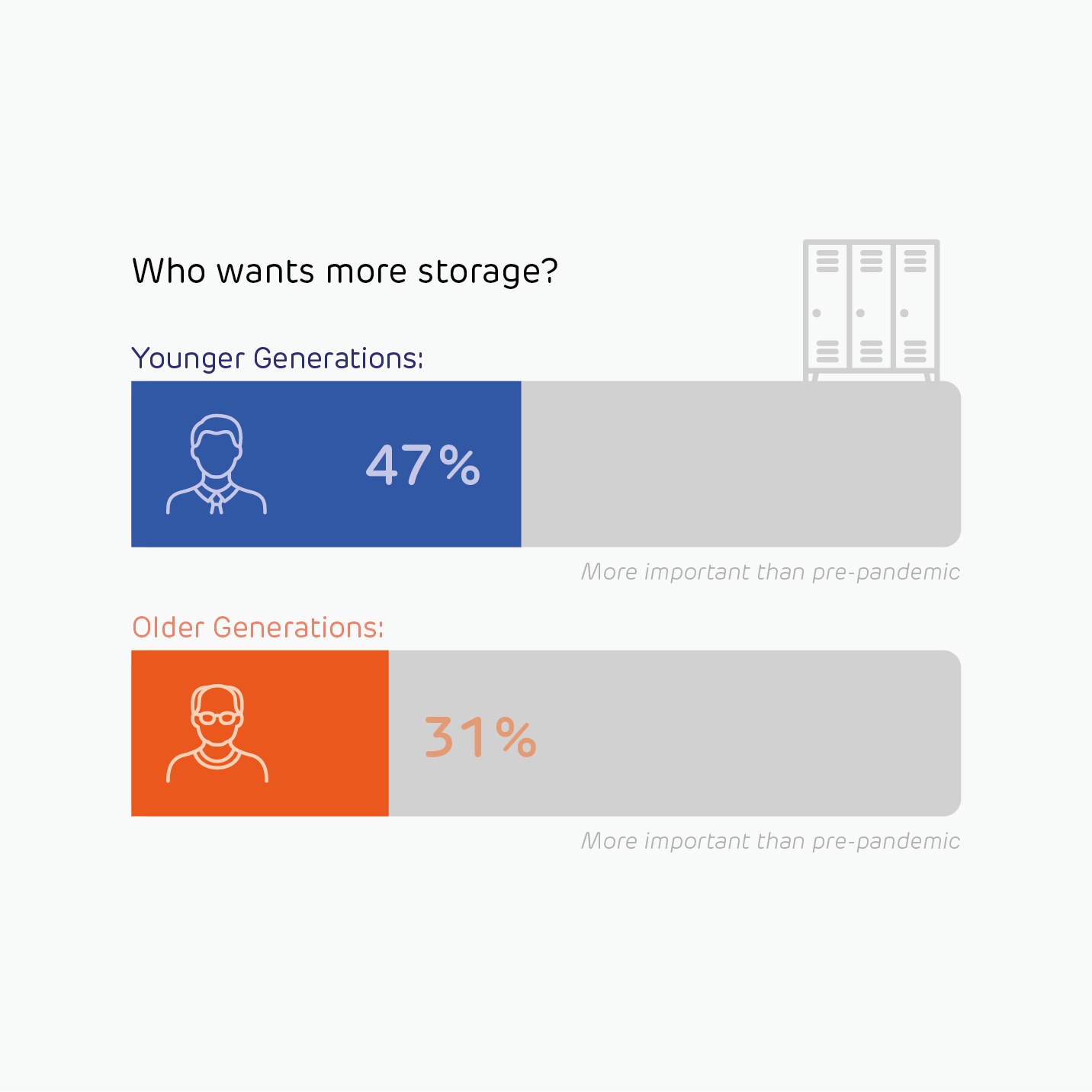
Conclusion
The Millennials and GenZer want a sense of diversity, freedom and mutual respect from their working environments. They want a business culture and collaborative approach that brings meaning and purpose to their working lives. They want the right tech and the right settings to complete their work. They want to feel valued and cared for in a way that Gen X never felt entitled to. Plus, they want lockers.
And as they are about to start calling the shots, we ignore them at our peril.





